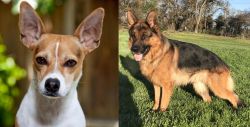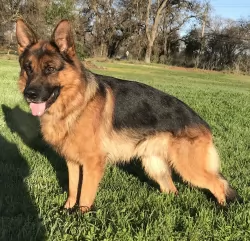 MyDogBreeds
MyDogBreeds Rat Terrier is originated from United States but German Shepherd is originated from Germany. Rat Terrier may grow 31 cm / 12 inches shorter than German Shepherd. Rat Terrier may weigh 40 kg / 88 pounds lesser than German Shepherd. Rat Terrier may live 5 years more than German Shepherd. Rat Terrier may have less litter size than German Shepherd. Both Rat Terrier and German Shepherd requires Low maintenance.
Rat Terrier is originated from United States but German Shepherd is originated from Germany. Rat Terrier may grow 31 cm / 12 inches shorter than German Shepherd. Rat Terrier may weigh 40 kg / 88 pounds lesser than German Shepherd. Rat Terrier may live 5 years more than German Shepherd. Rat Terrier may have less litter size than German Shepherd. Both Rat Terrier and German Shepherd requires Low maintenance.
 Known also as the American Rat Terrier or even as the Rattie, this American dog breed is a farm dog, common on family farms during the 1920's and 1930's.
Known also as the American Rat Terrier or even as the Rattie, this American dog breed is a farm dog, common on family farms during the 1920's and 1930's.
Miniatures or Standards, these dogs are also recognized by the American Kennel Clubs and thought of today as a multi-purpose companion dog.
He is an American dog breed, having come about from Fox Terriers, Old English White Terriers, Bull Terriers, Manchester Terriers and others. Whippets and Italian Greyhounds have also come into the mix to add speed as a characteristic.
The Rat Terrier started to decline in numbers, and by the 1950's the numbers of the dog were so low that breeders stepped in to restore numbers.
 In 1882 german shepherd was introduced in a show at Hanover. They were created
by the cross breeding of the rural sheep dogs by a man named Max. In 1906 they were first
exported to America. After that the breed became very popular in UK.
In 1882 german shepherd was introduced in a show at Hanover. They were created
by the cross breeding of the rural sheep dogs by a man named Max. In 1906 they were first
exported to America. After that the breed became very popular in UK.
 There are different sized Rat Terriers, but the mid-sized one stands roughly between 20 and 36cm in height and weighs between 3 and 4kg.
There are different sized Rat Terriers, but the mid-sized one stands roughly between 20 and 36cm in height and weighs between 3 and 4kg.
The single coat is short and smooth and comes in colors such as tan, grey, chocolate, black and in solid colors too such as white. They are mostly in tri-colors - white, tan, black. Ticking is also seen.
With his short coat he is seen as a low maintenance dog even though he is still a shedder, with heavier seasonal shedding.
The ears can sometimes be erect, otherwise they are half-erect, half floppy. The tail has always been traditionally docked, giving him a nice, distinctive look, but today the tail is often just left un-docked. It isn't unusual for a puppy to be born with a short or long tail.
Intelligent, wary, loyal, loving, playful but stubborn, your Rat Terrier is a little bit wary around strangers. Training and socialization can be good for this dog and help him t be obedient and well mannered in all situations. These dogs also want to please. He is an active dog too and makes a great playmate for children, getting on well with kids and other pets in the home.
 The GSD is very good for being a watchdog and hence it do not welcome guests to home.
But when trained from a puppy it will suit itself for making new friends. GSD like to be
always with somebody and they can be its master or his family members or else its partner.
The GSD is very intelligent and active hence they should be always kept busy, exercised
and playing. Nowadays many of them are trained well and made as four legged stars.
The GSD is very good for being a watchdog and hence it do not welcome guests to home.
But when trained from a puppy it will suit itself for making new friends. GSD like to be
always with somebody and they can be its master or his family members or else its partner.
The GSD is very intelligent and active hence they should be always kept busy, exercised
and playing. Nowadays many of them are trained well and made as four legged stars.
When we see all around the world many of them are involved in helping the physically challenged people. Also they are very important personnels in working with police and military for finding the criminals. Their excellent sniffing power works very good when given proper training for finding illegal smuggling. But basically the breed was set in to herd the sheep and protect them from predators.
Based on the popularity they are ranked 2nd in US and 4th in UK.
 The Rat Terrier is such a clever, bright dog. These characteristics make him an excellent watchdog with strong jaws for his role of getting rid of rats on farms.
The Rat Terrier is such a clever, bright dog. These characteristics make him an excellent watchdog with strong jaws for his role of getting rid of rats on farms.
Even though he is a small dog, he isn’t particularly suited to life in the city on a small property as he has quite a shrill bark.
Because of him being small to medium in size, he is well suited to many homes, but you just have to watch out in the city if you live close to your neighbors as he is fairly noisy and active.
He would love a large property where he can just be himself. Provide him with the right home, and you’l have a friend for life.
 The GSD is a very good child friendly dog, they love to play with kids.
The GSD is a very good child friendly dog, they love to play with kids.
They adopts both hot and cold climates, but they like cold weather very much and also their body is suitable for cold than hot.
The GSD has high ability to learn tricks and also they are interested in learning. As they have very high intelligence they learn very easily and quickly.
 Rat Terriers are generally feisty, healthy dogs who, with good care, can live to the ripe old age of 16, 17 or 18 years of age.
Rat Terriers are generally feisty, healthy dogs who, with good care, can live to the ripe old age of 16, 17 or 18 years of age.
Just like with many other dogs, he can develop some of the more common dog illnesses there are. If you're opting for a puppy, find a good, reputable breeder.
It can be tricky trying to decide what kind of allergies are causing such problems with your pet. A skin allergy can cause a lot of itchiness and pain for your canine friend and he will bite and lick on the affected spots and make the situation worse. You will need to get him to the vet for some kind of treatment, as such an ailment can drive him mad.
This is a common problem in dogs, with the kneecap or patella being dislocated. It can cause a lot of pain and can be crippling for your dog.
 The GSD has the chances for getting orthopaedic diseases such as hip dysplasia
and elbow dysplasia. Other common orthopaedic problems which affects GSD are Panosteitis,
Osteochondritis and cruciate ligament rupture.They also get some skin problems such as
allergies and pyoderma. Digestive problems such as chronic diarrhea and colitis are
also seen in GSD.
The GSD has the chances for getting orthopaedic diseases such as hip dysplasia
and elbow dysplasia. Other common orthopaedic problems which affects GSD are Panosteitis,
Osteochondritis and cruciate ligament rupture.They also get some skin problems such as
allergies and pyoderma. Digestive problems such as chronic diarrhea and colitis are
also seen in GSD.
GSD is a continuous shedder. They are having a two layer coat. They should be brushed daily as it will remove the dead fur and thus prevents shedding.
 Your Rat Terrier can easily reach 16, 17 or 18 years of age with good food. While you do get some excellent commercially manufactured dog foods, you want to add variety by including some nutritious home-made food too.
Your Rat Terrier can easily reach 16, 17 or 18 years of age with good food. While you do get some excellent commercially manufactured dog foods, you want to add variety by including some nutritious home-made food too.
Boiled chicken, brown rice or pasta and spinach, sweet potatoes and carrots are a healthy choice for your pet. Chop it up and add it into the dry kibble a couple of times a week.No complications - just plain and simple - the way dogs love it.
Some raw meat added in from time to time will help his skin and coat remain healthy. Never leave him without a constant source of fresh, cool water.
The Rat Terrier is an active dog. He just loves to dig too, so if you live close to a beach, he will love running and digging in the sand. If this isn’t possible, he will be happy to be taken on walks with you and maybe for a run in the park.
He loves all ball games and running after a frisbee, and he’s so clever, maybe you can even teach him to fetch the frisbee for you.
The Rat Terrier is a low-maintenance dog and only requires having his coat brushed twice a week.
Check inside his mouth for bad teeth. You can even brush his teeth with special canine toothpaste and brush to remove tartar buildup.
Keep his nails trimmed too if he doesn’t wear them down naturally so as to prevent them hooking on things and ripping into the flesh.
Check inside your dog’s ears too. If you’re not experienced with trimming dog nails or cleaning inside dog’s ears, your vet or professional groomer will do it for you.
During these grooming sessions with your Rat Terrier, check for fleas and ticks as well as for any sores or new lumps. Also, his eyes should be clear and bright with no discharge or redness.
 The GSD should be given an cool environment which they will enjoy a lot.
The GSD should be given an cool environment which they will enjoy a lot.
The GSD puppy should be fed small quantities of food but several times per day as it needs to gain 2 gms weight per day. The preferred food for them is dry food along with raw liver pieces which would provide them excellent energy. The protein food given to puppy should contain 25 to 30% calories. Puppies consume more food when compared with adults.
The GSD needs a food which has a considerable amount of protein. They are carnivores in the nature. The protein can be given from cooked meat. The artificial food products will not be suitable for them. When are provided with protein food they will gain fat from itself. The recommended fat content for GSD is 5% to 8%.
The GSD should be provided with a nutritional food for their good health.
Physical exercises are very much needed for GSD since they are very energetic and power packed. It is highly recommended to make them play and run daily as they don't need to get bored. They can be made to climb in hilly areas as they want to explore their surroundings. They can be made to swim or play hide and seek and find the missing objects. Regular morning walk will be very good for them.